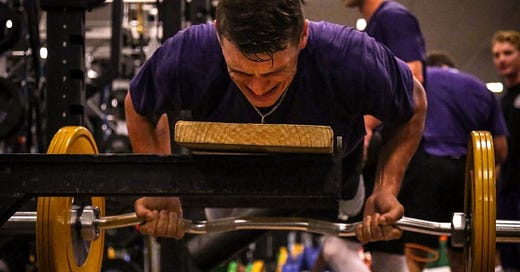Building the College-Ready Baseball Body: What Coaches Are Really Looking For
Why Too Many Baseball Prospects Miss College Opportunities
5 Reasons Why Physical Development Determines College Baseball Success
After 30+ years combined experience in coaching, scouting, and running showcases, we've seen a consistent pattern: the physically developed players almost always rise to the top of recruiting boards—regardless of position.
The Reality of College Baseball Today
College baseball has evolved dramatically. Players who could compete on physical attributes alone a decade ago wouldn't even get recruited today. The standards have risen across every division level, and the gap between high school and college baseball is wider than ever.
When we talk to college coaches about their recruiting priorities, they consistently tell us that while skills matter, they're increasingly focused on players who can handle the physical demands of the college game.
Reason 1: Speed Creates Opportunities Everywhere
Speed is the one tool that impacts every aspect of baseball performance:
Infielders: Expanded range and faster transfers
Outfielders: Better jump and greater coverage area
Catchers: Quicker pop times and better baserunning control
Pitchers: More explosive deliveries and better fielding position
Hitters: Higher batting averages through infield hits and defensive pressure
In our experience, we've consistently seen players with average skills but above-average speed receive more recruiting interest than skilled players with below-average speed. It's simply the most transferable athletic trait across all positions.
Reason 2: Arm Strength Opens More Doors
Arm strength remains one of the most coveted tools in baseball recruiting:
Separates prospects at every position
Creates positional versatility
Extends a player's competitive ceiling
We've observed hundreds of recruiting scenarios where arm strength became the deciding factor between similarly skilled players. A strong arm gives coaches options—they can move players around the field, create various lineup combinations, and develop prospects for multiple roles.
Reason 3: Explosive Power Translates Everywhere
Power isn't just about hitting home runs:
Pitchers: Higher velocity and better late-inning stamina
Catchers: Improved throwing and blocking ability
Infielders: Stronger throws across the diamond and better range
Outfielders: Deeper defensive range and stronger throws to bases
All positions: Better exit velocity and extra-base potential
In our conversations with college coaches across all divisions, they consistently emphasize power development as a primary indicator of future success. Players with raw power tools can be molded and developed—but you can't teach explosiveness. It has to be developed, and when its not there, college coaches know that will take time… maybe more time than they’re willing to commit.
Reason 4: Recovery Capacity Extends Careers
The physical demands of college baseball are exponentially greater than high school:
More games in shorter timeframes
Higher intensity training sessions
Year-round commitment (fall ball, spring season, summer leagues)
From our experience working with hundreds of college programs, the players who thrive are those with physical foundations that support rapid recovery. Talent means nothing if a player's body breaks down midway through the season.
Reason 5: Physical Durability Creates Consistency
College coaches tell us repeatedly that they value consistency above almost everything else:
Players who can perform day after day
Athletes who maintain velocity and power late in seasons
Prospects who don't require special management to stay healthy
We've watched too many talented players fade away because they couldn't handle the physical demands. The players who succeed at higher levels aren't always the most skilled—they're the ones who show up ready to perform every single day.
Moving Forward
Physical development isn't just about getting bigger and stronger—it's about building the foundation that allows baseball skills to shine consistently at the next level.
What does this mean for you?
The specific path forward will vary from player to player based on age and current development, but there is one thing that 100% applies to every single player that wants to play college baseball - your physical development should be a TOP priority.
Next week, we’ll go deeper on this topic with our trusted partners, 5 Tool Connection.
Stay tuned and talk soon!
Matt
Founder, Prospects Playbook





